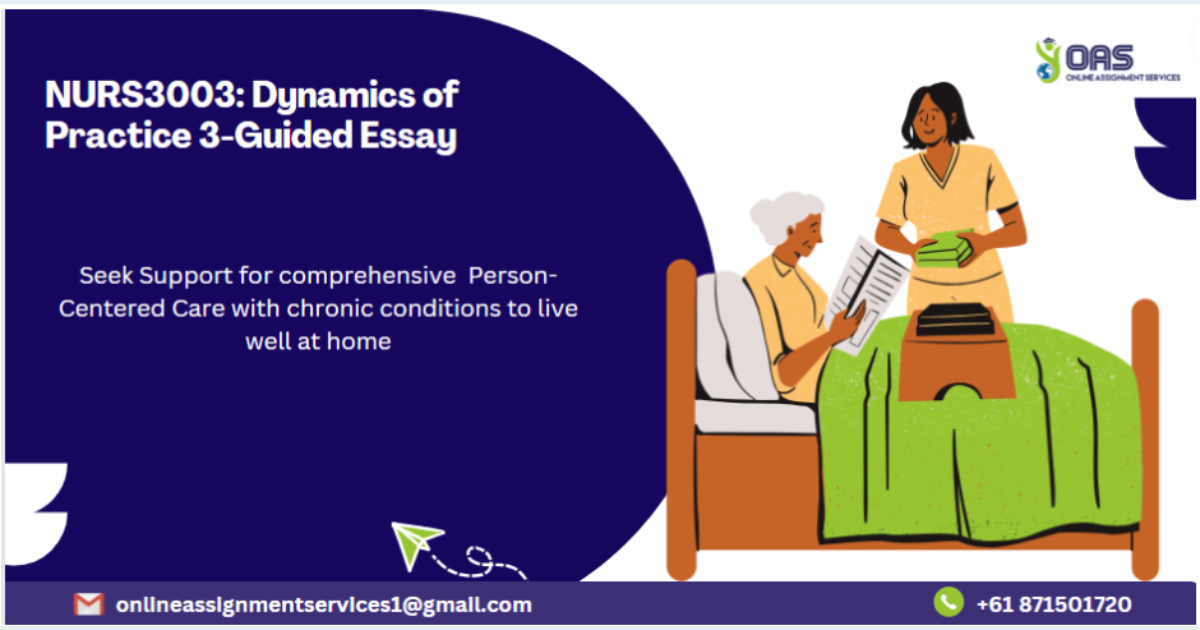NURS3003: Dynamics of Practice 3-Guided Essay Assignment Help

NURS3003 Guided Essay is a collection of four tasks, divided into two parts, Part A and Part B. Part A consists of three tasks and requires students to demonstrate their knowledge about complex needs in chronic conditions, barriers and enablers to healthy living at home and the role played by RNs in supporting PCC. Part B is focused on one specific task and requires students to then apply the knowledge gained from Part A to a specific case study.
Our experts have prepared a detailed guided sample for all students who are finding it difficult to solve this assignment. By providing 50% solutions to Tasks 1, 2, 3 and 4, we hope to showcase how well our experts cater to every requirement of the assessment. Please read ahead to get an Idea!
Task 1 required students to discuss complex links between concepts of complex needs faced by patients, chronic conditions and avoiding hospitals. While discussing these concepts, it was necessary to consider the perspective of self-management and look at provisions available in the Australian healthcare system. Following is the solution presented by our experts:
Task 1: Chronic conditions / complex needs and hospital avoidance
Chronic conditions have been identified to be contributing largely to deaths and disabilities across the globe, which is causing an increased economic burden (Sarkis et al., 2020). Hence, on considering both, economic levels and clinical levels, strategies of self-management along with other promising strategies are being established.
In terms of patients with chronic diseases and complex needs, it has been identified that there is an increased need of constant hospitalisation which can lead to an increased financial burden for the patients and also increases the probability of gaining several infections. Thus, it would be necessary to manage the chronic conditions of the patients within the home environment and reduce the overall hospital admissions. In order to ensure hospital avoidance of the patients with chronic diseases, the person-centred care approach has been identified to be effective. It is focused on three core principles; one is to engage in patient participation to ensure their involvement in sharing the exact set of problems in order to list out the exact care facilities. Second to build a trustworthy relationship between the patient and healthcare professionals where the patients would be able to share every detail and also engage in the decision-making process of care facilities. Thirdly, the context should be considered where the care would be delivered in an effective manner. This would need the consideration of the resources and the facilities that can be utilised (Peart et al., 2019). There should be collaboration and partnership between the patient and the care providers.
This is 50% guided solution only! Please Call us at +61 871501720 for assistance in completing Task 1.
Task 2 required students to identify a specific sociological barrier to avoiding hospitals and managing self while living at home. While fulfilling this requirement, our experts begin by explaining concepts of agency and social capital and then describe how either ageism or social capital might result in structural barriers.
Task 2: Biopsychosocial barriers
One of the “sociological” barriers in terms of hospital avoidance and person- centred self-management in the person’s home is the power and control regarding the care plan resides largely on the patient or the members associated with the patients, who are mostly not the professionals. Thus, most of the time, the understanding about the proceedings of the care facilities is limited among the patients which leads to an ineffectiveness in terms of the establishment of the adequate care for the patients (Taylor & Taylor, 2013). In such cases, few patients have cultural beliefs or restrictions regarding certain care services whereas some patients are not updated with the advanced methods and opts for the traditional methods which would not be sufficient to meet the needs. Thus, the person-centred care being more about the changing the requirements based on the person’s need can be challenging for the care professionals and interfere with the betterment of the patients.
Regarding the understanding of the sociological concept of ‘structure & agency’, structure can be defined as the recurrent set of patterns and arrangements that would influence as well as limit the choices or opportunities that would be available (Frankel, 2017). On the other hand, agencies are established as the capacity being provided to the individuals in acting independently and to manage making their own set of choices. In choosing a sociological concept, ageism can be considered.
Please Call us at +61 871501720 for a complete list of Biophysical factors!

Task 3 required students to identify the key role played by nursing professionals in ensuring that patients are well supported at their home. While completing this task, our experts have carefully analyzed the role of nurses from multiple perspectives.
Task 3: Role of Registered Nurses
Chronic illnesses by its nature are complex and an increasing burden on the premature deaths across the world. The task associated with person-centred care in terms of managing illness has become among the core challenges for the healthcare systems to manage. Based on the study by Griffin et al., (2017), the role of registered nurse (RN) within the community in treating the chronic illness in alignment with the person-centred care are to provide the clients or the patients orientations in dealing with the chronic diseases and working to support the integration of the chronic illness within the everyday lives of the patients. On considering the first point, that is to provide the clients or the patients orientations in dealing with the chronic diseases in the person-centred care role, it has been identified that ill individuals lack the adequate knowledge regarding the illnesses and hence, they mostly remain uncertain in making the appropriate decisions to manage the challenges associated with the chronic disease (Wyman et al., 2018).
Please WhatsApp us at +44 7956859420 for determining the complete role of a Registered Nurse!
Task 4 (Part B) required students to carefully analyse the case study of Mrs and Mr. Waters while highlighting some critical barriers they face while managing themselves at home. Students were also required to assess support needs and discuss how these needs can be met. Please read on to know how every aspect of the question has been meaningfully decoded by our experts!
Task 4: Case Study
Two person-centred support needs for Ellen Walters and her family that will promote self-management in the home would include “coordination and integration of care needs”, “physical support needs” and “emotional support needs”. As per the case study, Ellen has been facing lack of insight associated with the physical as well as mental abilities and prior to deterioration of her condition, the healthcare professionals mostly engage in talking with Michael than Ellen, which has further made her upset. In addition to this, it can also lead a gap to the medication being provided to her as it can lead to the limitation by Ellen in sharing the details about the problems being faced by her or the details associated with her situation. Thus, ensuring the implementation of “coordination and integration of care needs” would ensure proper coordination regarding care with the patients which would reduce the vulnerability (Wilberforce et al., 2016). The person-centred care would ensure effective coordination in terms of clinical care, requirement of the support services and also with the front-line patient care. This would ensure effective involvement of Ellen as a patient with the healthcare professionals. In addition to this, Ellen has a tendency to move out of the house all by herself and forget the way back. Also, since both are older adults, the ability to take care of each other is also low. Next, it has been identified that fear associated with chronic illnesses can be as harmful as the physical effects. Thus, in person-centred care, it is important for the caregivers to provide particular attention to the anxiety or mental stress associated with the physical status along with the impact of the financial status in terms of managing the illnesses (Wilberforce et al., 2016). As per the case study, Ellen is suffering from dementia, which leads to mental depression due to the loss in the cognitive abilities. In addition to this, Ellen restricts from using any supportive devices and does not use the walking stick due to the notion of looking “ugly”.
Please WhatsApp us at +44 7700 174710 for complete solution of the case study!

